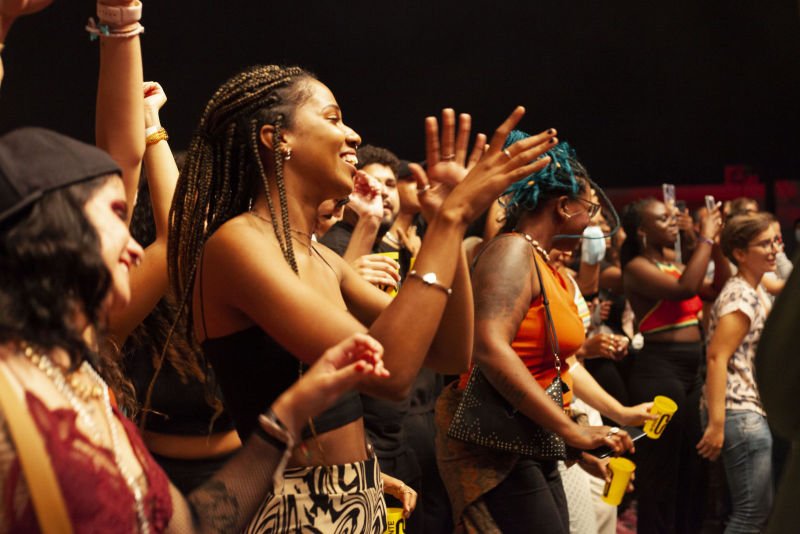Festival Freedoms: IMINENTE

It is a still summer in the early days of October 2021, when the independently organised Iminente festival kicks off at Matinha, the post industrial outskirts of Lisbon. The eclectic line-up, three stages and exquisite weather, fuel a sense of unbridled escapism we’ve all been searching for. The sandy wind and razor-sharp blue sky gives the illusion of a dreamlike mirage; a slo-mo shockwave of joy, that will last four days. Swinging bodies move and glow in the dark, in wet and voluptuous sonic heatwaves. The intimacy and fusion of the crowd form a womb of warmth and togetherness. It’s finally time to abandon the playlist looping in the living room (also known as the office, yoga parlour, kindergarten, and home cinema), and re-enter the world of live music. As multidisciplinary content creator Claudine Boeglin points her camera at the eager Iminente festival-goers, she provides us with a time-capsule and the experience of transcending back into the space of festivals, in the oddest times of history, and asks the question: “How has the pandemic affected our relationship with space and live music”?
March 2020 - people and trade were forced into reclusion and silence. Crowds became furtive silhouettes lining up for food or running solo and the nightclubs that once bursted with music descended into silence. Now, the live music scene reignites itself. Although, something is different. In Lisbon’s Iminente festival there is a renewed appreciation of shared time, space and purpose. Despite a period of unemployment and financial decline, festival goers set aside their Amazon orders in favour of purchasing the experiences they have been deprived of. Locals leave their homes to become a part of a collective unity, where their identities amalgamate into one, and evolve together in space and time. Claudine notes how “social anxiety and fears fall” in this space “where the reality of the world vanishes” as they “wrap into the fiction of live music”. Once again, we can lose our identities in anonymous dance circles and circles of love as we shout to the lyrics of our favourite songs in unison with thousands of others, after months of karaoke in the shower, in solitude.
“After this long period of isolation, expectations were high and people were really missing the proximity and intimacy embodied by Iminente, which led to a very emotional event.”
As artists and festival goers continue to face toughened travel restrictions, they begin to discover the music festivals available at their doorsteps. Travelling across the globe to perform or visit a festival is no longer an option. Claudine observes how Iminente drew on local artists from different cultural backgrounds more so than ever before. This more independently crafted local festival is perhaps an opportunity to create space for those artists who have always been around, but lacked recognition. Iminente director Carla Cardoso, reflects on how this impacted the festival.
“The pandemic was a catalyst for major changes. Last year (2020) we adapted the format of the festival and created an event that accommodated the restrictions and increased our outreach work with marginalised communities across the city, which opened up a series of new possibilities in terms of designing the programme and increasing visibility for emerging artists.”
One of them, Engracia Domingos da Silva, better known by her stage name Pongo, is an Angolan singer and songwriter of kuduro, rap and a pop artist. Born in Luanda, Angola, she immigrated with her family to Lisboa, Portugal, escaping from the Angolan civil war. As her sound permeates its way through the festival, elevating everyone around her, she jumps off the stage and begins to sing among the crowd. The ecstasy and exhilaration of her movements at such close proximity to the crowd creates an unforgettable moment.
The remainder of the lineup was as diverse as the crowd on each of the three stages. Claudine notes her best moments with Cape Verdean born Eu.Clides and his delicate songs from ’Terra-Mãe’, a tribute to freedom in times of pandemic, Pongo's blent of Angolan kuduro and rap performance, and DYI fashionista Herlander’s cheeky 'anti-pop’ magnetic show. She recalls the crowd’s ecstasy responding to Nenny's first official live show on the massive Gasómetro Stage, the wildness of Cape Verdean Jon Luz's dancefloor, the meditative quatuor Active Mess and David Bruno's 'Latin lover’ goofiness.
“We created a space where the audience had true proximity with the artists and solidified our understanding of how important it is to continue creating visibility for emerging artists, levelling the playing field with established ones.”
Here we are, in the early hours of the festival, with this elevated and renewed appreciation for live music. Locals realise they no longer need to travel far for a festival. So far, it seems the pandemic may have taught us a few lessons in how we experience space and music. The value in purchasing live experiences and music, not needing to travel far, the desire to reduce our carbon footprint to reach live music, and appreciating the locality of our music and experiences.
The symbiotic power of music through diverse, local talent helps provide a definition of how we understand and define space. As such, ‘this festival tells the story of Portugal and its musical psyche; an inestimable heritage of cultures held tight and alive by the artists and audiences themselves’.
This work is an increment of a larger photographic series produced between 2016 and 2021 at the edge of live stages in London, Barcelona, Berlin, New York and Lisbon. Defined as an anthropop essay on urban culture in motion, Where Were You? 'documents the cultural transhumance and collective trance music ignites under its sensonic dome'.
“Photography itself in its inquisitive presence, feels a distorted vessel when recording emotions. An epidermic technology prone to oversize or rigidify smiles and postures, it only covers the stratum of seeing, masking more complex nuances of human exchanges. ”
Words by Sheida Kiran and Claudine Boeglin
Photography by Claudine Boeglin















